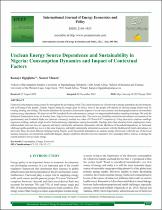| dc.description.abstract | Fuelwood is the primary energy source for throughout the developing world. This, indiscriminate use of fuelwood as energy jeopardizes the environment,
and well-being of the people. Despite Nigeria being the energy giant in Africa, most of her people still depend on unclean energy [fuelwood] for
cooking, heating, and boiling. This article underlines the dynamics and essential impacts of social cum economic and demographic indexes on household
unclean energy dependence. We interviewed 994 household fuelwood consumers, using a two-stage stratified random sampling technique. We used the
delineated Enumeration Areas for Katsina State, Nigeria for socioeconomic data. The test re-test reliability method (trustworthiness assessment of the
questionnaire) and Cronbach Alpha test (internal constancy) resulted in a value of 0.70 and 0.875 respectively. Using descriptive statistics and logit
regression, findings indicate a high level of fuelwood energy dependence among households. Findings show that education level, employment status,
and household structure have an opposite and highly statistically substantial relationship with the likelihood of household dependence on fuelwood,
while age and household size move in the same trajectory and highly statistically substantial association with the likelihood of family dependence on
fuelwood. Thus, the most difficult challenge facing Nigeria as per household dependence on unclean energy (fuelwood) is that the use of fuelwood
increase economic, environmental, and health dangers. dangers and It has therefore become imperative for a paradigm shift in policies to change the
current narrative toward clean energy | en_US |

